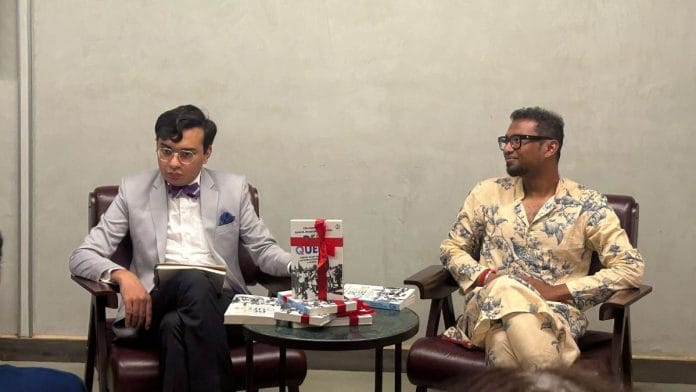New Delhi: When the regular archival mediums such as public libraries failed to shed much light onto the lives of queers from the Indian subcontinent in Britain, the authors of Desi Queers decided to take the unconventional route. They began digging through informal collections of people’s history and experiences tucked away in homes and community-led projects to document a history often erased from institutional records.
Desi Queers: LGBTQ+ South Asians and Cultural Belonging in Britain, edited by Rohit K Dasgupta, Churnjeet Mahn, and DJ Ritu, is based on 28 interviews conducted with queer people from the subcontinent.
Dasgupta, an associate professor of gender and sexuality at the London School of Economics, was in conversation with Rohin Bhatt, a queer lawyer and author, at the launch of the book at New Delhi’s LGBTQIA+ Centre, a multifunctional community space for queer founded by Naz Foundation, on a rainy evening on 12 August. The event was attended by students, researchers, and members of the queer community for whom the book has become a medium to take forward the conversations about them.
Among the most significant sources was a complete collection of Shakti Khabar, the newsletter of Shakti, the first organisation of queer people from the subcontinent in Britain founded in 1988. Shakti was not merely an activist collective; it was a cultural hub, bringing people together through drag performances, parties, collectivism, and campaigns. Its spirit has been kept alive through institutions like the Naz Foundation, Naz Project London, and the still-thriving Club Kali, a club for the queer community of the Indian subcontinent in London.
Dasgupta also revealed the challenges that came with the recovery of archives.
“These archives raise very difficult questions about ownership, about access and belonging,” he said, adding that the book builds on three interwoven strands — archives, oral histories, and art.
“How do we make public memory of what is out there?”
Struggles and identities
The conversation revolved around the book’s chapters. While Bhatt pointed out the use of certain words and highlighted key sections, Dasgupta patiently unpacked their nuances, drawing the audience in. Many picked up copies of the book on the spot.
Of the 28 interviews in the book, one that Dasgupta found worth retelling was the story of Ash, a member of The Chutney Queens, a drag collective comprising people from the subcontinent.
Recalling dancing with their mother at weddings, Ash realised their movements had been an act of release, “an act of resistance wrapped in joy.” That joy, they had recognised, lived on in them too.
Dasgupta said that it was their encounter with such anecdotes that kept the authors interested in the project, even when things got difficult. “There is something powerful in making space for intergenerational vulnerability between queer South Asians in Britain,” he said.
The book also examines the role of queer artists in the UK who have roots in the Indian subcontinent — from filmmakers such as Hanif Kureishi and Gurinder Chadha to visual artists Sunil Gupta and Pratibha Parmar, and more contemporary figures such as drag artist Asifa Lahore. These creators, said Dasgupta, invented new cultural vocabularies that wove queerness into British identities linked to the subcontinent.
Also read: A Partition journey from Jhang to Hisar. Avoiding bitterness helped family thrive
Politics of ‘desi’
The discussion turned to the contested language of identity, with Dasgupta noting unease around the term ‘desi’ and concerns about the book’s title. “In the book, ‘desi’ is treated less as a label and more as a framework, one that in Britain speaks to both belonging and being marked as foreign.”
Another language of identity-making has been music, he said, adding that Bhangra in Britain evolved differently from its Punjabi roots, reflecting diasporic longing, solidarity, and adaptation. Yet, unity has often been fragile. Queer people of the subcontinent once organised under political blackness, a solidarity that obscured caste and class privilege. Now, new rifts are deepening with the “rise of Hindutva” and ethno-nationalist politics, Dasgupta said.
He also read from the book during the event, choosing an excerpt that encapsulated its emotional centre. He began with a 1983 letter written by a 17-year-old British-Pakistani student to the Gay Black Group in London: “Although I was born in Britain, my parents originate from Pakistan and are very strict Muslims. My parents have arranged a marriage for me that will take place sometime next year. I do not know what to do, how can I explain to them that I’m gay?”
This letter, Dasgupta said, “captures a moment that is heartbreakingly familiar for many queer South Asians. It is a voice caught between obligation and identity, between fear and hope. And this is where Desi Queers begins.”
(Edited by Aamaan Alam Khan)






